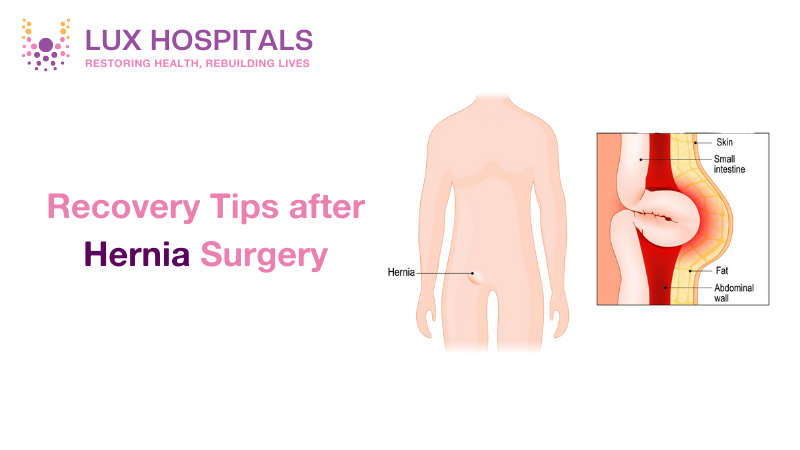HERNIA SURGERY RECOVERY TIPS FOR A SMOOTH HEALING PROCESS

Hernia surgery, being relatively common, is performed for the treatment of various types of hernias, including inguinal, umbilical, and femoral. The surgery itself isn’t so bad, but recovery plays a significant role in coming out with the best results and no complications. Understanding the recovery will help you manage your expectations and ensure a smooth healing process.
In this guide, we will discuss general recovery time, specific recovery time by different hernia surgeries, and essential hernia surgery recovery tips to help you heal fast and safely and return to your regular activities as soon as possible.
What is Hernia Surgery?
A hernia occurs when an internal organ or tissue pushes through a weak spot in the muscle or connective tissue, with inguinal and umbilical hernias being the most common. Surgery, performed either through traditional open or laparoscopic methods, repairs the defect and often includes mesh reinforcement to prevent recurrence. While the procedure is generally safe, a proper recovery period is crucial for preventing complications, reducing discomfort, and ensuring a successful repair.
Hernia Surgery Recovery Time: What to Expect
The recovery time after hernia surgery can be different depending on factors such as the type of hernia, the surgical approach used, your overall health, and how well you follow hernia surgery recovery tips. Most patients can expect their recovery period to be a few weeks to a few months, but knowing the general timeline will help you plan accordingly.
General Recovery Timeline
- First Week: The first couple of days after surgery are generally the most difficult due to the area surrounding the incision swelling and bruises, and it is somewhat sore. It is important to rest during this time and not exert the surgical site. Short walks should be taken gently to increase blood circulation and prevent blood clots.
- Second Week: By the second week, many patients start feeling better. You’ll still need to avoid heavy lifting and strenuous activities, but you may return to light daily tasks. Pain and discomfort should decrease significantly during this time.
- Third to Fourth Week: By the end of the first month, many patients can resume light physical activities, but it’s essential to listen to your body and not push too hard. You’ll likely feel more comfortable, and swelling should significantly reduce. However, high-impact exercises and lifting heavy objects should still be avoided.
- One to Three Months: Full recovery typically takes 1 to 3 months, depending on the individual and the type of surgery performed. It’s essential to continue avoiding heavy lifting and intense physical activity during this period to give the surgical site time to heal fully. See your surgeon for follow-up appointments to make sure everything is going according to plan.
Specific Recovery Times for Different Hernia Surgeries
The recovery times for different types of hernia surgeries may vary slightly. Here’s a breakdown of what you can expect for specific types of hernia repairs:
Inguinal Hernia Surgery Recovery Time
Inguinal hernias are one of the most common types, particularly in men. Inguinal hernia surgery recovery time generally takes around 4 to 6 weeks for most patients, with some individuals returning to normal activities sooner. If the surgery is minimally invasive, the recovery time can be shorter, as the incisions are smaller, and there is less tissue disruption.
Umbilical Hernia Surgery Recovery Time
Umbilical hernia surgery recovery time is typically similar to inguinal hernia surgery recovery. Most patients can resume light activities within 1 to 2 weeks after surgery, while complete recovery may take up to 4 to 6 weeks. In some cases, if the hernia is more complex or involves larger defects, recovery may take longer.
Recovery After Open vs. Laparoscopic Hernia Surgery
- The type of surgery open or laparoscopic affects hernia surgery recovery time.
- Laparoscopic surgery typically has a shorter recovery due to smaller incisions.
- Patients who undergo laparoscopic surgery can resume regular activities within 1 to 2 weeks.
- Strenuous physical activities should be avoided for a few months.
- Open surgery may require a longer recovery due to larger incisions and more tissue disruption.
Hernia Surgery Recovery Tips: Best Practices for Healing
Following these hernia surgery recovery tips will help ensure a smoother healing process and reduce your risk of complications.
1. Rest and Avoid Physical Exertion
After hernia surgery, the most important recovery tip is getting adequate sleep. Limit your physical activity during the first two weeks after surgery to avoid straining the surgical site. This includes heavy lifting, bending, or intense physical exercise. Listen to your body if you feel discomfort or pain, take it easy.
2. Gradually Increase Activity Levels
While rest is crucial, so is gradually increasing your activity levels as you heal. Short walks around your home or a brief stroll outside can help improve blood circulation and promote healing. But don’t jump right into physically demanding activities. A sudden rise in exercise can put stress on the healing tissues and cause you to take longer to recover.
3. Follow Pain Management Instructions
It’s normal to experience some pain and discomfort after hernia surgery, but following your surgeon’s prescribed pain management plan can help alleviate these symptoms. It could be necessary to take over-the-counter or prescription painkillers during the first several days. Take medicines as directed to keep yourself comfortable while you heal.
4. Keep the Surgical Area Clean and Dry
Good hygiene during recovery helps to prevent infection. Keep the incision area clean and dry, and follow your surgeon’s instructions concerning wound care. If your doctor has given you specific ways to clean or dressings to apply, be sure to follow these carefully.
5. Eat a Balanced Diet
A healthy diet is necessary to promote healing and support your immune system. The consumption of different fruits, vegetables, lean proteins, and whole grains will result in your body getting all the nutrients necessary for it to heal fast. In addition, make sure you stay hydrated by drinking plenty of water to prevent constipation, which can put extra strain on your abdominal area.
6. Wear Compression Garments If Recommended
In some cases, your surgeon may recommend wearing a compression garment to help reduce swelling and provide support to the abdominal area during the recovery process. If this is the case, be sure to wear the garment as instructed.
7. Avoid Smoking and Alcohol
Smoking can significantly slow the healing process and increase your risk of complications after surgery. If you smoke, it’s best to quit or at least avoid smoking during your recovery period. Alcohol can also interfere with painkillers and slow the healing process, so it’s better to abstain from it until you’re completely well.
8. Follow Your Surgeon’sSurgeon’s Instructions
Your surgeon will provide specific post-surgery instructions tailored to your condition and surgical approach. Be sure to follow these instructions carefully, as they are designed to ensure proper healing and reduce the risk of complications.
9. Attend Follow-up Appointments
These will help the doctor to keep an eye on how well you’re recovering and watch out for any possible complications. In addition to checking the healing of your incision, the doctor will examine the area and address any other concerns or questions you may have. You can rest easy knowing that you are on the path to a full recovery if you attend your follow-up appointments.
10. Monitor for Warning Signs of Complications
While complications after hernia surgery are rare, watch for any signs of infection or other issues, such as excessive swelling, redness, discharge from the incision site, or fever. If you have any of these symptoms, call your surgeon right away.
Conclusion
Recovery from hernia surgery doesn’t have to be a stressful or uncertain process. Follow these hernia surgery recovery tips to make the healing process as smooth as possible and to get back to your routine as quickly as possible. Whether you have undergone inguinal, umbilical, or any other kind of hernia surgery, following the instructions of your surgeon, taking care of your body and gradually increasing your level of activity will set you up for success.
Be patient, and allow your body the time it needs to heal completely. The majority of patients will recover uneventfully and will find their quality of life significantly improved after surgery.
Frequently Asked Questions
Recovery time can vary, but most people take about 4 to 6 weeks to fully recover. It may take longer, depending on the type of surgery and your health.
The typical recovery time for inguinal hernia surgery is 4 to 6 weeks, with many patients resuming light activities within 1 to 2 weeks.
Recovery time for laparoscopic hernia surgery is typically 1 to 2 weeks for light activities and 4 to 6 weeks for full recovery, including strenuous activities.
It’s best to wait until you are no longer taking pain medications and can move comfortably without discomfort before resuming driving. This usually takes 1 to 2 weeks.
Avoid heavy lifting, strenuous activities, and anything that may put pressure on the surgical area. Follow your surgeon’s guidelines for a safe recovery.
Applying ice packs and wearing compression garments as recommended by your surgeon can help reduce swelling during the early stages of recovery.




















